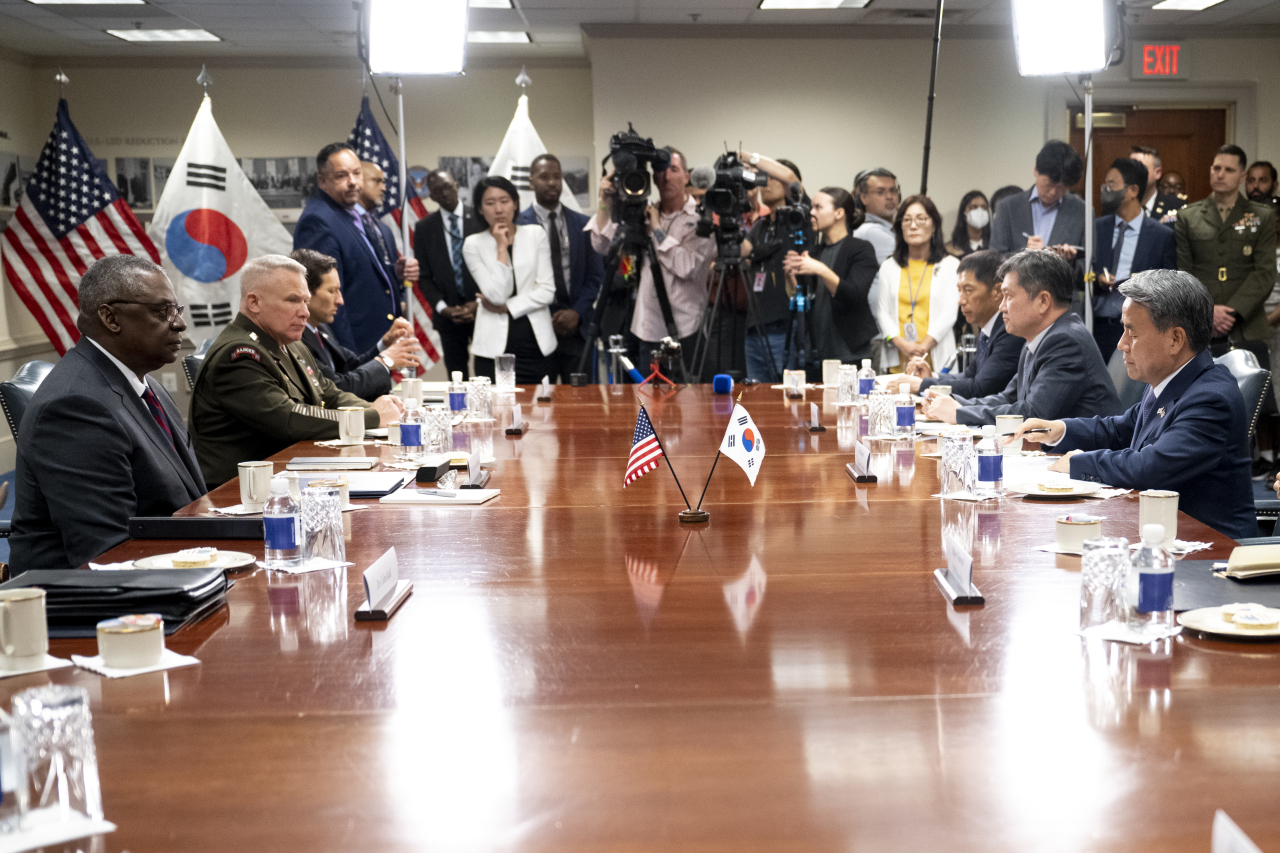 |
Secretary of Defense Lloyd J. Austin III hosts South Korean Minister of National Defense Lee Jong-sup for talks at the Pentagon, Washington, D.C., July 29, 2022. (File Photo- US Department of Defense) |
Lee and Austin will discuss major alliance issues including the assessment of the security situation on the Korean Peninsula and policy coordination and global security cooperation, according to South Korea’s Defense Ministry.
The key topic will be ways to enhance the viability of the US extended deterrence and strengthen the South Korea-US combined defense posture and readiness against mounting missile and nuclear threats from North Korea.
South Korea’s focus is to discuss “various and concrete” ways to enhance the viability of the US extended deterrence during the forthcoming consultation, a senior official at the Defense Ministry, who wished to remain anonymous, said Friday before the press embargo on the meeting was lifted.
Extended deterrence is the US commitment to deter or respond to coercion and attacks on US allies and partners. The US nuclear umbrella is one means the US offers to achieve extended deterrence.
To be specific, South Korea and the US are expected to put their heads together on how to “make a shift” to deploy and exercise US strategic assets on the Korean Peninsula more efficiently.
The deployment of strategic US military assets -- which include a nuclear-powered aircraft carrier and a nuclear bomber -- on the peninsula is the key means to enhance the alliance’s deterrence against North Korea threats.
President Yoon Suk-yeol and US President Joe Biden reaffirmed the US commitment to deploy US strategic assets “in a timely and coordinated manner as necessary” at their May 21 summit. Biden and Yoon agreed to step up such measures and identify new or additional steps to reinforce deterrence against North Korean threats.
During the upcoming meeting, Seoul and Washington will also discuss how to conduct annual combined military drills involving large-scale field training exercises next year to improve the South Korea-US combined defense posture, according to the official.
Seoul and Washington in August brought back an annual large-scale combined military exercise that had been suspended in the aftermath of then-US President Donald Trump’s commitment at the first US-North Korea summit in June 2018. The annual Ulchi Freedom Shield notably included various types of field training exercises that had been scaled down and conducted sporadically throughout the year.
The primary purpose of the upcoming meeting is to provide “greater assurance to the public” about the allies’ capabilities and to send a “stern message to North Korea,” the senior South Korean official said. The official explained that the security situation of the Korean Peninsula is “very pressing, given that threats from North Korea have become more advanced than in the past and the country threatens to preemptively use nuclear weapons.”
Other topics for discussion include trilateral security cooperation among South Korea, the US and Japan in countering North Korean threats as well as peace and stability across the Taiwan Strait. Lee and Austin will also discuss how the allies coordinate in the Indo-Pacific region.
Lee is scheduled to arrive in the US capital Washington on Tuesday to attend the annual security talks. Prior to the meeting, Lee will visit the National Geospatial-Intelligence Agency, an intelligence and combat support agency under the auspices of the US Defense Department.
Lee will be the first South Korean defense minister to visit the agency headquartered in Springfield, Virginia. The NGA provides “strategic intelligence that allows the president and national policymakers to make crucial decisions on counterterrorism, weapons of mass destruction, global political crises and more,” the agency says on its website.
The NGA reportedly provides geospatial intelligence and information about North Korea -- obtained through intelligence, surveillance and reconnaissance assets -- to the US and South Korean militaries and the US Forces Korea.







